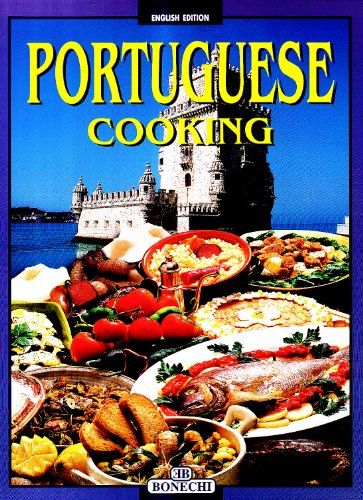The Rich Culinary Heritage of Portuguese Cuisine
Portuguese cuisine is a vibrant tapestry of flavors, traditions, and history, reflecting centuries of cultural exchange and maritime exploration. As showcased on the cover of Portuguese Cooking by Bonechi, this gastronomic tradition offers an enticing array of dishes that celebrate both land and sea, deeply rooted in regional authenticity and Mediterranean influence.
A Legacy of Exploration and Diversity
Portugal’s culinary identity has been shaped by its seafaring past. During the Age of Discoveries, Portuguese explorers brought back spices, ingredients, and cooking techniques from Africa, Asia, and South America. These global influences merged with local traditions to form a cuisine that is both rustic and refined.
The image featured on the cover—a lavish spread of seafood, cured meats, vegetables, and desserts—highlights the country’s rich bounty. Dishes such as bacalhau à brás (salt cod with eggs and potatoes), caldo verde (green soup with kale and chouriço), and cataplana de marisco (seafood stew) are staples of Portuguese dining, emphasizing simplicity and bold flavors.
Seafood at the Heart of the Plate
Portugal’s long Atlantic coastline provides an abundance of fresh fish and shellfish, which are central to the national diet. The cover prominently displays a whole grilled fish, garnished with herbs and vegetables—a testament to the country’s preference for fresh, minimally processed ingredients. Codfish, or bacalhau, is particularly revered, with over 365 traditional recipes, one for each day of the year.
Regional Specialties and Local Ingredients
From the hearty stews of the north to the lighter, Mediterranean-style dishes of the south, each region in Portugal boasts its own culinary specialties. Northern regions favor rich meats, sausages, and smoked products, while the Algarve in the south is known for seafood and Moorish-inspired sweets made from almonds and figs.
The cookbook cover also features elements of Mediterranean diet principles, including olive oil, legumes, fresh vegetables, and wine—ingredients that not only define Portuguese meals but also contribute to health and longevity.
Preserving Culture Through Food
Books like Portuguese Cooking serve as more than just culinary guides—they are cultural documents that preserve traditional recipes and cooking techniques passed down through generations. They invite readers to explore the country’s rich heritage and bring the flavors of Portugal into their own kitchens.
As global interest in authentic, regional cooking continues to grow, Portuguese cuisine stands out as a flavorful and meaningful culinary tradition, grounded in history and shaped by exploration.

